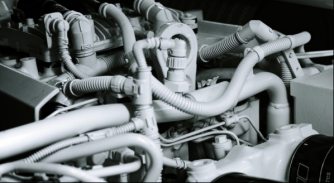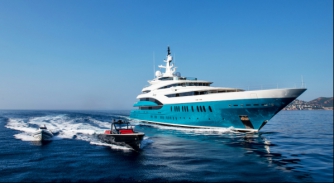Diverse solutions create diverse problems
How will shipyards be made to adapt to superyachts becoming increasingly complex?
If I had a penny for every time I have written about how ‘superyachts have grown in size and complexity’ I’d have a boat load of pennies and would be well on my way to buying a large, complex superyacht of my own. However, I have rarely paused to think about how this growing complexity is likely to impact shipyard operations in the future. In fact, it took a new contact made today to open my eyes as to just how fundamentally the onset of new technologies might alter the yacht building process.
While there are various systems and processes to choose from, I will focus on propulsion, interior subcontractors and specialist systems manufacturers to outline my point. At this point, I would like to note that the conclusions are my own (with some basis in previous research projects) and, therefore, I am open to counterarguments and solutions from shipyards and other interested parties.
Propulsion is probably one of the clearest examples of why shipyard processes may be forced to change in the future. We are at a fascinating juncture in the market’s development where there is number of technologies that are vying for future supremacy.
Is the future electric, hydrogen, methanol, nuclear, ammonia, wind, biofuels, solar, various combinations of all these options or some other next-generation solution that hasn't made it onto this unexhaustive list? Regardless, whichever way you spin it, the future is complicated. It has a variety of options and, therefore, it has an even greater variety of challenges. There is a lot of knowledge that needs developing in house, especially given that the superyacht industry has traditionally been keen to point out how it manufactures exactly what the owner desires.
It seems almost unfathomable that any individual shipyard will have the internal resources to cover every single sustainable propulsion system or combination of systems, especially given that there is widespread concern about a decline in technically skilled workers in shipyards globally. Each of the available technologies has its own complexities and will undoubtedly require its own experts if the yards wish to complete the works using only in-house resources. Will the shipyards try and learn from the tech companies and develop in house skills, or will the shipyards need the tech companies to step in as subcontractors to complete the works? The question, therefore, becomes not, ‘what sustainable propulsion systems shall we use?’, but, ‘how do we integrate these systems effectively, safely and cost-efficiently?’
We have already seen certain shipyards increasingly ceding project management responsibility to various subcontractors across many sectors. Notable recent projects completed by The Superyacht Agency have highlighted how there is an increasingly large expectation for project management services from both interior subcontractors and specialist yachting systems manufacturers & integrators (pasarelles, balconies, gangways etc). Such is the complexity of certain specialist systems, shipyards are already increasingly reliant on the expertise and project management skills of subcontracted experts.
While it is a slightly extreme example, if subcontractor control is already required for specialist, well-tested, well-proven systems, imagine how much responsibility must be ceded for the integration of nuclear power or other technologies that are, at this point, novel within the superyacht build community.
To suggest that shipyards are unable to adapt to the task at hand would be absolutely unfair. But, when one considers other sectors that are developing at equally breakneck speeds, the scale of the problem becomes clearer. Other considerations include seakeeping, manoeuvring systems, home automation, vessel automation, AV/IT (holograms etc), systems to reduce environmental impact, data & communications, IOT, remote monitoring, the list goes and one can say (with relative surety) that many of these fall outside shipyards’ typical comfort zones.
There are, of course, solutions to these problems. Whether through acquisitions, partnerships or otherwise, shipyards will be able to adapt to future challenges. But, it is unlikely, given how diverse the future is, that they will be able to maintain the levels of control that they have traditionally had. Is this necessarily a bad thing? Probably not. For a number of years now the market has been looking beyond itself and considering what it can learn, borrow or steal from other industries. Soon, there may be the confluence between the superyacht market and beyond that sees the industry take the necessary steps towards perfection that it has promised to its clients for so long.
NEW: Sign up for SuperyachtNewsweek!
Get the latest weekly news, in-depth reports, intelligence, and strategic insights, delivered directly from The Superyacht Group's editors and market analysts.
Stay at the forefront of the superyacht industry with SuperyachtNewsweek
Click here to become part of The Superyacht Group community, and join us in our mission to make this industry accessible to all, and prosperous for the long-term. We are offering access to the superyacht industry’s most comprehensive and longstanding archive of business-critical information, as well as a comprehensive, real-time superyacht fleet database, for just £10 per month, because we are One Industry with One Mission. Sign up here.
Related news

EXCLUSIVE: Myanmar teak trafficked through Italy
Despite EU laws, the Environmental Investigation Agency reveals that Myanmar teak is still moving through Europe and being used in the yachting industry
Business

The human cost
Are automation and craftsmanship diametrically opposed? How might this impact the future of the superyacht industry?
Business

Calling all sales brokers
We want to know how readily brokers sell into hybrid propulsion? Is hybrid an attractive proposition for superyacht owners?
Technology

A matter of perspective?
With the homogenisation of sustainable practices being the goal, should we stop fixating on the rationale?
Business

The usual suspects
We explore the brokerage market's strong performance with Edmiston and consider how long it is likely to last
Owner

IPCC report paints a bleak picture
If climate change persists at this rate, regions and ecosystems that the yachting community relies upon will be irreparably damaged
Business
Related news
EXCLUSIVE: Myanmar teak trafficked through Italy
4 years ago
The human cost
4 years ago
Calling all sales brokers
4 years ago
A matter of perspective?
4 years ago
The usual suspects
4 years ago
IPCC report paints a bleak picture
4 years ago
Aston Lark acquires ES Risks
4 years ago
NEW: Sign up for
SuperyachtNewsweek!
Get the latest weekly news, in-depth reports, intelligence, and strategic insights, delivered directly from The Superyacht Group's editors and market analysts.
Stay at the forefront of the superyacht industry with SuperyachtNewsweek




